- Home
- J. M. Barrie
Tommy and Grizel Page 5
Tommy and Grizel Read online
Page 5
CHAPTER V
THE TOMMY MYTH
On the evening before the christening, Aaron Latta, his head sunkfarther into his shoulders, his beard gone grayer, no otherperceptible difference in a dreary man since we last saw him in thebook of Tommy's boyhood, had met the brother and sister at thestation, a barrow with him for their luggage. It was a great hour forhim as he wheeled the barrow homeward, Elspeth once more by his side;but he could say nothing heartsome in Tommy's presence, and Tommy wasas uncomfortable in his. The old strained relations between these twoseemed to begin again at once. They were as self-conscious as twomastiffs meeting in the street; and both breathed a sigh of reliefwhen Tommy fell behind.
"You're bonny, Elspeth," Aaron then said eagerly. "I'm glad, glad tosee you again."
"And him too, Aaron?" Elspeth pleaded.
"He took you away frae me."
"He has brought me back." "Ay, and he has but to whistle to you andaway you go wi' him again. He's ower grand to bide lang here now."
"You don't know him, Aaron. We are to stay a long time. Do you knowMrs. McLean invited us to stay with her? I suppose she thought yourhouse was so small. But Tommy said, 'The house of the man whobefriended us when we were children shall never be too small for us.'"
"Did he say that? Ay, but, Elspeth, I would rather hear what yousaid."
"I said it was to dear, good Aaron Latta I was going back, and to noone else."
"God bless you for that, Elspeth."
"And Tommy," she went on, "must have his old garret room again, towrite as well as sleep in, and the little room you partitioned off thekitchen will do nicely for me."
"There's no a window in it," replied Aaron; "but it will do fine foryou, Elspeth." He was almost chuckling, for he had a surprise inwaiting for her. "This way," he said excitedly, when she would havegone into the kitchen, and he flung open the door of what had been hiswarping-room. The warping-mill was gone--everything that had beenthere was gone. What met the delighted eyes of Elspeth and Tommy was acozy parlour, which became a bedroom when you opened that other door. "You are a leddy now, Elspeth," Aaron said, husky with pride, "andyou have a leddy's room. Do you see the piano?"
He had given up the warping, having at last "twa three hunder'" in thebank, and all the work he did now was at a loom which he had put intothe kitchen to keep him out of languor. "I have sorted up the garret,too, for you," he said to Tommy, "but this is Elspeth's room."
"As if Tommy would take it from me!" said Elspeth, running into thekitchen to hug this dear Aaron.
"You may laugh," Aaron replied vindictively, "but he is taking it fraeyou already"; and later, when Tommy was out of the way, he explainedhis meaning. "I did it all for you, Elspeth; 'Elspeth's room,' Icalled it. When I bought the mahogany arm-chair, 'That's Elspeth'schair,' I said to mysel'; and when I bought the bed, 'It's hers,' Isaid. Ay; but I was soon disannulled o' that thait, for, in spite ofme, they were all got for him. Not a rissom in that room is yours ormine, Elspeth; every muhlen belongs to him."
"But who says so, Aaron? I am sure he won't."
"I dinna ken them. They are leddies that come here in their carriagesto see the house where Thomas Sandys was born."
"But, Aaron, he was born in London!" "They think he was born in thishouse," Aaron replied doggedly, "and it's no for me to cheapen him."
"Oh, Aaron, you pretend----"
"I was never very fond o' him," Aaron admitted, "but I winna cheapenJean Myles's bairn, and when they chap at my door and say they wouldlike to see the room Thomas Sandys was born in, I let them see thebest room I have. So that's how he has laid hands on your parlor,Elspeth. Afore I can get rid o' them they gie a squeak and cry, 'Wasthat Thomas Sandys's bed?' and I says it was. That's him taking thevery bed frae you, Elspeth."
"You might at least have shown them his bed in the garret," she said.
"It's a shilpit bit thing," he answered, "and I winna cheapen him.They're curious, too, to see his favourite seat."
"It was the fender," she declared.
"It was," he assented, "but it's no for me to cheapen him, so I letthem see your new mahogany chair. 'Thomas Sandys's chair,' they callit, and they sit down in it reverently. They winna even leave you thepiano. 'Was this Thomas Sandys's piano?' they speir. 'It was,' says I,and syne they gowp at it." His under lip shot out, a sure sign that hewas angry. "I dinna blame him," he said, "but he had the samemasterful way of scooping everything into his lap when he was aladdie, and I like him none the mair for it"; and from this positionAaron would not budge.
"Quite right, too," Tommy said, when he heard of it. "But you can tellhim, Elspeth, that we shall allow no more of those prying women tocome in." And he really meant this, for he was a modest man that day,was Tommy. Nevertheless, he was, perhaps, a little annoyed to find, asthe days went on, that no more ladies came to be turned away.
He heard that they had also been unable to resist the desire to shakehands with Thomas Sandys's schoolmaster. "It must have been a pleasureto teach him," they said to Cathro.
"Ah me, ah me!" Cathro replied enigmatically. It had so often been apleasure to Cathro to thrash him!
"Genius is odd," they said. "Did he ever give you any trouble?"
"We were like father and son," he assured them. With natural pride heshowed them the ink-pot into which Thomas Sandys had dipped as a boy.They were very grateful for his interesting reminiscence that when thepot was too full Thomas inked his fingers. He presented several ofthem with the ink-pot.
Two ladies, who came together, bothered him by asking what the HughBlackadder competition was. They had been advised to inquire of himabout Thomas Sandys's connection therewith by another schoolmaster, aMr. Ogilvy, whom they had met in one of the glens.
Mr. Cathro winced, and then explained with emphasis that the HughBlackadder was a competition in which the local ministers were thesole judges; he therefore referred the ladies to them. The ladies didgo to a local minister for enlightenment, to Mr. Dishart; but, afterreflecting, Mr. Dishart said that it was too long a story, and thisanswer seemed to amuse Mr. Ogilvy, who happened to be present.
It was Mr. McLean who retailed this news to Tommy. He and Ailie hadwalked home from church with the newcomers on the day after theirarrival, the day of the christening. They had not gone into Aaron'shouse, for you are looked askance at in Thrums if you pay visits onSundays, but they had stood for a long time gossiping at the door,which is permitted by the strictest. Ailie was in a twitter, as ofold, and not able even yet to speak of her husband without anapologetic look to the ladies who had none. And oh, how proud she wasof Tommy's fame! Her eyes were an offering to him.
"Don't take her as a sample of the place, though," Mr. McLean warnedhim, "for Thrums does not catch fire so readily as London." It wasquite true. "I was at the school wi' him," they said up there, andimplied that this damned his book.
But there were two faithful souls, or, more strictly, one, for Corpcould never have carried it through without Gavinia's help. Tommycalled on them promptly at their house in the Bellies Brae (fourrooms, but a lodger), and said, almost before he had time to look,that the baby had Corp's chin and Gavinia's eyes. He had made this upon the way. He also wanted to say, so desirous was he of pleasing hisold friends, that he should like to hold the baby in his arms; but itwas such a thundering lie that even an author could not say it.
Tommy sat down in that house with a very warm heart for its inmates;but they chilled him--Gavinia with her stiff words, and Corp bylooking miserable instead of joyous.
"I expected you to come to me first, Corp," said Tommy, reproachfully."I had scarcely a word with you at the station."
"He couldna hae presumed," replied Gavinia, primly.
"I couldna hae presumed," said Corp, with a groan.
"Fudge!" Tommy said. "You were my greatest friend, and I like you asmuch as ever, Corp." Corp's face shone, but Gavinia said at once,"You werena sic great friends as that; were you, man?"
"No," Corp replied gloomily.
/> "Whatever has come over you both?" asked Tommy, in surprise. "You willbe saying next, Gavinia, that we never played at Jacobites in theDen!"
"I dinna deny that Corp and me played," Gavinia answered determinedly,"but you didna. You said to us, 'Think shame,' you said, 'to beplaying vulgar games when you could be reading superior books.' Theywere his very words, were they no, man?" she demanded of her unhappyhusband, with a threatening look.
"They were," said Corp, in deepest gloom.
"I must get to the bottom of this," said Tommy, rising, "and as youare too great a coward, Corp, to tell the truth with that shamelesswoman glowering at you, out you go, Gavinia, and take your disgracedbairn with you. Do as you are told, you besom, for I am Captain Strokeagain."
Corp was choking with delight as Gavinia withdrew haughtily. "I wassure you would sort her," he said, rubbing his hands, "I was sure youwasna the kind to be ashamed o' auld friends."
"But what does it mean?"
"She has a notion," Corp explained, growing grave again, "that itwouldna do for you to own the like o' us. 'We mauna cheapen him,' shesaid. She wanted you to see that we hinna been cheapening you." Hesaid, in a sepulchral voice, "There has been leddies here, and theywant to ken what Thomas Sandys was like as a boy. It's me they speirfor, but Gavinia she just shoves me out o' sight, and says she, 'Leavethem to me.'"
Corp told Tommy some of the things Gavinia said about Thomas Sandys asa boy: how he sat rapt in church, and, instead of going bird-nesting,lay on the ground listening to the beautiful little warblers overhead,and gave all his pennies to poorer children, and could repeat theShorter Catechism, beginning at either end, and was very respectful tothe aged and infirm, and of a yielding disposition, and said, from hisearliest years, "I don't want to be great; I just want to be good."
"How can she make them all up?" Tommy asked, with respectful homage toGavinia.
Corp, with his eye on the door, produced from beneath the bed a littlebook with coloured pictures. It was entitled "Great Boyhoods," by"Aunt Martha." "She doesna make them up," he whispered; "she gets themout o' this."
"And you back her up, Corp, even when she says I was not your friend!"
"It was like a t' knife intil me," replied loyal Corp; "every time Iforswore you it was like a t' knife, but I did it, ay, and I'll go ondoing it if you think my friendship cheapens you."
Tommy was much moved, and gripped his old lieutenant by the hand. Healso called Gavinia ben, and, before she could ward him off, themasterful rogue had saluted her on the cheek. "That," said Tommy, "isto show you that I am as fond of the old times and my old friends asever, and the moment you deny it I shall take you to mean, Gavinia,that you want another kiss."
"He's just the same!" Corp remarked ecstatically, when Tommy had gone.
"I dinna deny," Gavinia said, "but what he's fell taking"; and for atime they ruminated.
"Gavinia," said Corp, suddenly, "I wouldna wonder but what he's a geylad wi' the women!"
"What makes you think that?" she replied coldly, and he had theprudence not to say. He should have followed his hero home to bedisabused of this monstrous notion, for even while it was beingpropounded Tommy was sitting in such an agony of silence in a woman'spresence that she could not resist smiling a crooked smile at him. Hiswant of words did not displease Grizel; she was of opinion that youngmen should always be a little awed by young ladies.
He had found her with Elspeth on his return home. Would Grizel calland be friendly? he had asked himself many times since he saw her inchurch yesterday, and Elspeth was as curious. Each wanted to knowwhat the other thought of her, but neither had the courage to inquire,they both wanted to know so much. Her name had been mentioned butcasually, not a word to indicate that she had grown up since they sawher last. The longer Tommy remained silent, the more, he knew, didElspeth suspect him. He would have liked to say, in a careless voice,"Rather pretty, isn't she?" but he felt that this little Elspeth wouldsee through him at once.
For at the first glance he had seen what Grizel was, and a thrill ofjoy passed through him as he drank her in; it was but the joy of theeyes for the first moment, but it ran to his heart to say, "This isthe little hunted girl that was!" and Tommy was moved with a manlygladness that the girl who once was so fearful of the future had growninto this. The same unselfish delight in her for her own sake cameover him again when he shook hands with her in Aaron's parlor. Thisglorious creature with the serene eyes and the noble shoulders hadbeen the hunted child of the Double Dykes! He would have liked to raceback into the past and bring little Grizel here to look. How manyboyish memories he recalled! and she was in every one of them. Hisheart held nothing but honest joy in this meeting after so many years;he longed to tell her how sincerely he was still her friend. Well, whydon't you tell her, Tommy? It is a thing you are good at, and youhave been polishing up the phrases ever since she passed down theaisle with Master Shiach in her arms; you have even planned out a wayof putting Grizel at her ease, and behold, she is the only one of thethree who is at ease. What has come over you? Does the reader think itwas love? No, it was only that pall of shyness; he tried to fling itoff, but could not. Behold Tommy being buried alive!
Elspeth showed less contemptibly than her brother, but it was Grizelwho did most of the talking. She nodded her head and smiled crookedlyat Tommy, but she was watching him all the time. She wore a dress inwhich brown and yellow mingled as in woods on an autumn day, and thejacket had a high collar of fur, over which she watched him. Let ussay that she was watching to see whether any of the old Tommy was leftin him. Yet, with this problem confronting her, she also had time tostudy the outer man, Tommy the dandy--his velvet jacket (a new one),his brazen waistcoat, his poetic neckerchief, his spotless linen. Hisvelvet jacket was to become the derision of Thrums, but Tommy took hisbonneting haughtily, like one who was glad to suffer for a Cause.There were to be meetings here and there where people told with awehow many shirts he sent weekly to the wash. Grizel disdained his dandytastes; why did not Elspeth strip him of them? And oh, if he mustwear that absurd waistcoat, could she not see that it would lookanother thing if the second button was put half an inch farther back?How sinful of him to spoil the shape of his silly velvet jacket bycarrying so many letters in the pockets! She learned afterwards thathe carried all those letters because there was a check in one of them,he did not know which, and her sense of orderliness was outraged.Elspeth did not notice these things. She helped Tommy by herhelplessness. There is reason to believe that once in London, when shehad need of a new hat, but money there was none, Tommy, looking verydefiant, studied ladies' hats in the shop-windows, brought all hisintellect to bear on them, with the result that he did concoct out ofElspeth's old hat a new one which was the admired of O.P. Pym andfriends, who never knew the name of the artist. But obviously he couldnot take proper care of himself, and there is a kind of woman, of whomGrizel was one, to whose breasts this helplessness makes an unfairappeal. Oh, to dress him properly! She could not help liking to be amother to men; she wanted them to be the most noble characters, butcompletely dependent on her.
Tommy walked home with her, and it seemed at first as if Elspeth'sabsence was to be no help to him. He could not even plagiarize from"Sandys on Woman." No one knew so well the kind of thing he should besaying, and no one could have been more anxious to say it, but aweight of shyness sat on the lid of Tommy. Having for half an hourraged internally at his misfortune, he now sullenly embraced it. "If Iam this sort of an ass, let me be it in the superlative degree," hemay be conceived saying bitterly to himself. He addressed Grizelcoldly as "Miss McQueen," a name she had taken by the doctor's wishsoon after she went to live with him.
"There is no reason why you should call me that," she said. "Call meGrizel, as you used to do."
"May I?" replied Tommy, idiotically. He knew it was idiotic, but thatmood now had grip of him.
"But I mean to call you Mr. Sandys," she said decisively.
He was really glad to hear it, for to be called Tommy by
anyone wasnow detestable to him (which is why I always call him Tommy in thesepages). So it was like him to say, with a sigh, "I had hoped to hearyou use the old name."
That sigh made her look at him sharply. He knew that he must becareful with Grizel, and that she was irritated, but he had to go on.
"It is strange to me," said Sentimental Tommy, "to be back here afterall those years, walking this familiar road once more with you. Ithought it would make me feel myself a boy again, but, heigh-ho, ithas just the opposite effect: I never felt so old as I do to-day."
His voice trembled a little, I don't know why. Grizel frowned.
"But you never were as old as you are to-day, were you?" she inquiredpolitely. It whisked Tommy out of dangerous waters and laid him at herfeet. He laughed, not perceptibly or audibly, of course, but somewhereinside him the bell rang. No one could laugh more heartily at himselfthan Tommy, and none bore less malice to those who brought him toland.
"That, at any rate, makes me feel younger," he said candidly; and nowthe shyness was in full flight.
"Why?" asked Grizel, still watchful.
"It is so like the kind of thing you used to say to me when we wereboy and girl. I used to enrage you very much, I fear," he said, halfgleefully.
"Yes," she admitted, with a smile, "you did."
"And then how you rocked your arms at me, Grizel! Do you remember?"
She remembered it all so well! This rocking of the arms, as theycalled it, was a trick of hers that signified sudden joy or pain. Theyhung rigid by her side, and then shook violently with emotion.
"Do you ever rock them now when people annoy you?" he asked.
"There has been no one to annoy me," she replied demurely, "since youwent away."
"But I have come back," Tommy said, looking hopefully at her arms.
"You see they take no notice of you."
"They don't remember me yet. As soon as they do they will cry out."
Grizel shook her head confidently, and in this she was pitting herselfagainst Tommy, always a bold thing to do.
"I have been to see Corp's baby," he said suddenly; and this was soimportant that she stopped in the middle of the road.
"What do you think of him?" she asked, quite anxiously.
"I thought," replied Tommy, gravely, and making use of one of Grizel'spet phrases, "I thought he was just sweet."
"Isn't he!" she cried; and then she knew that he was making fun ofher. Her arms rocked.
"Hurray!" cried Tommy, "they recognize me now! Don't be angry,Grizel," he begged her. "You taught me, long ago, what was the rightthing to say about babies, and how could I be sure it was you until Isaw your arms rocking?"
"It was so like you," she said reproachfully, "to try to make me doit."
"It was so unlike you," he replied craftily, "to let me succeed. And,after all, Grizel, if I was horrid in the old days I alwaysapologized."
"Never!" she insisted.
"Well, then," said Tommy, handsomely, "I do so now"; and then theyboth laughed gaily, and I think Grizel was not sorry that there was alittle of the boy who had been horrid left in Tommy--just enough toknow him by.
"He'll be vain," her aged maid, Maggy Ann, said curiously to her thatevening. They were all curious about Tommy.
"I don't know that he is vain," Grizel replied guardedly.
"If he's no vain," Maggy Ann retorted, "he's the first son of Adam itcould be said o'. I jalouse it's his bit book."
"He scarcely mentioned it."
"Ay, then, it's his beard."
Grizel was sure it was not that.
"Then it'll be the women," said Maggy Ann.
"Who knows!" said Grizel of the watchful eyes; but she smiled toherself. She thought not incorrectly that she knew one woman of whomMr. Sandys was a little afraid.
About the same time Tommy and Elspeth were discussing her. Elspeth wasin bed, and Tommy had come into the room to kiss her good-night--hehad never once omitted doing it since they went to London, and he wasalways to do it, for neither of them was ever to marry.
"What do you think of her?" Elspeth asked. This was their great timefor confidences.
"Of whom?" Tommy inquired lightly.
"Grizel."
He must be careful.
"Rather pretty, don't you think?" he said, gazing at the ceiling.
She was looking at him keenly, but he managed to deceive her. She wasmuch relieved, and could say what was in her heart. "Tommy," she said,"I think she is the most noble-looking girl I ever saw, and if shewere not so masterful in her manner she would be beautiful." It wasnice of Elspeth to say it, for she and Grizel were never very greatfriends.
Tommy brought down his eyes. "Did you think as much of her as that?"he said. "It struck me that her features were not quite classic. Hernose is a little tilted, is it not?"
"Some people like that kind of nose," replied Elspeth. "It is notclassic," Tommy said sternly.

 Peter Pan
Peter Pan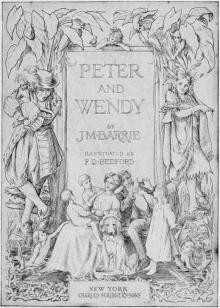 Peter and Wendy
Peter and Wendy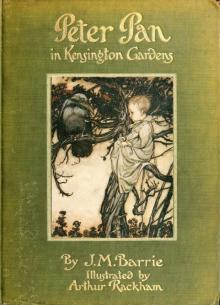 Peter Pan in Kensington Gardens
Peter Pan in Kensington Gardens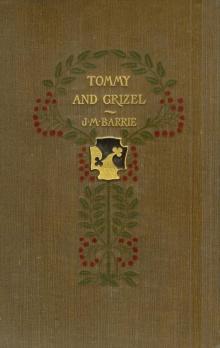 Tommy and Grizel
Tommy and Grizel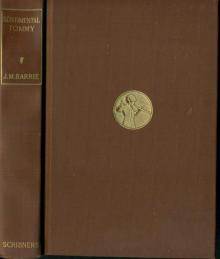 Sentimental Tommy
Sentimental Tommy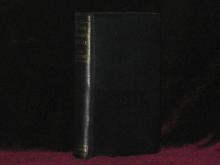 When a Man's Single: A Tale of Literary Life
When a Man's Single: A Tale of Literary Life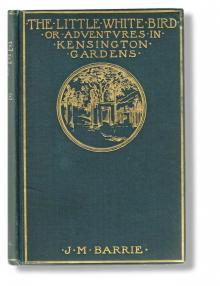 The Little White Bird; Or, Adventures in Kensington Gardens
The Little White Bird; Or, Adventures in Kensington Gardens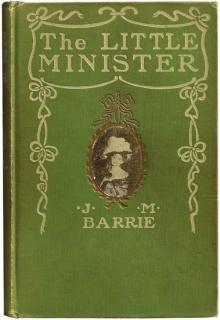 The Little Minister
The Little Minister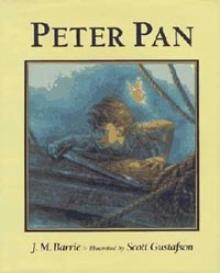 Peter Pan (peter pan)
Peter Pan (peter pan)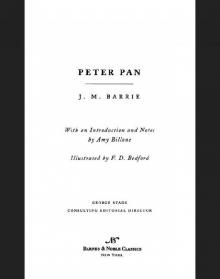 Peter Pan (Barnes & Noble Classics Series)
Peter Pan (Barnes & Noble Classics Series)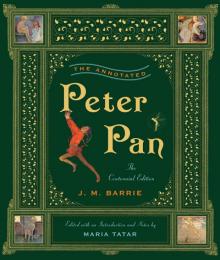 The Annotated Peter Pan (The Centennial Edition) (The Annotated Books)
The Annotated Peter Pan (The Centennial Edition) (The Annotated Books)